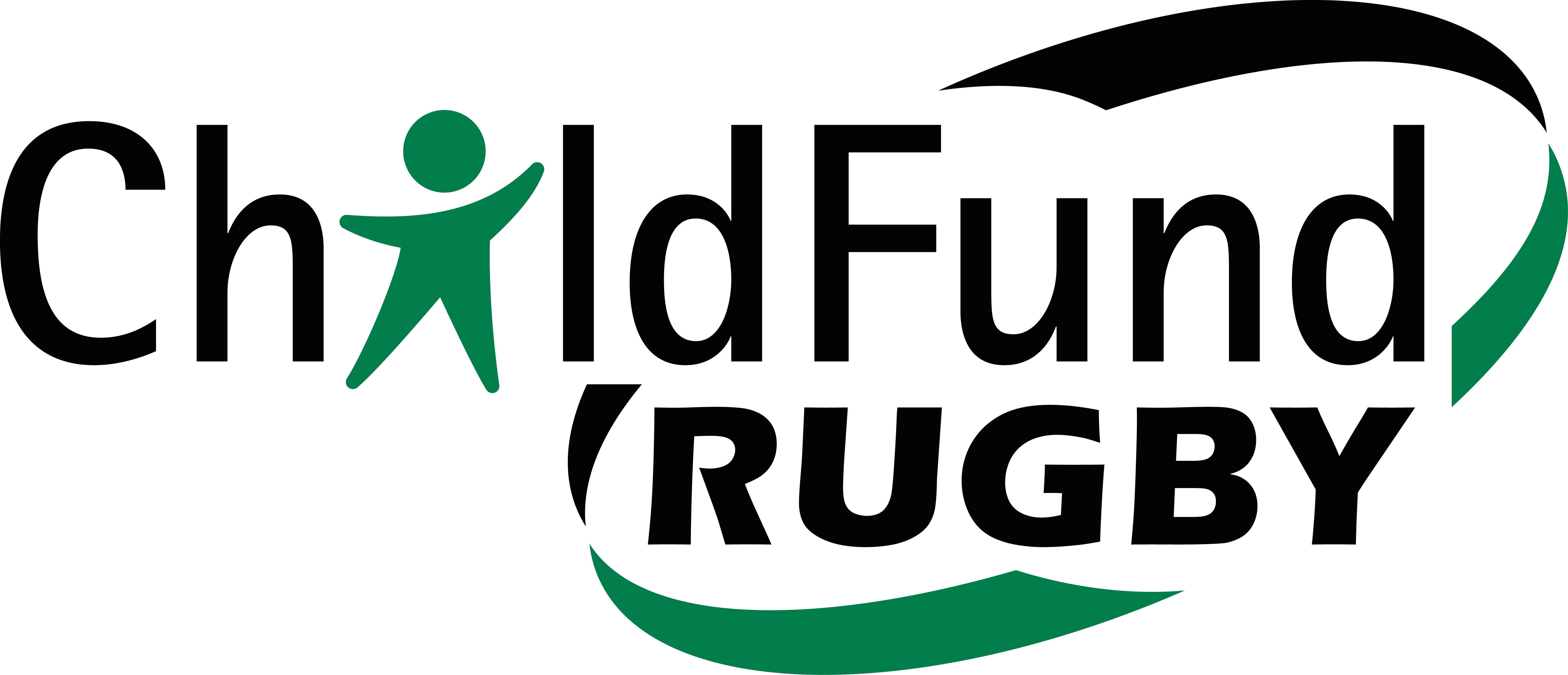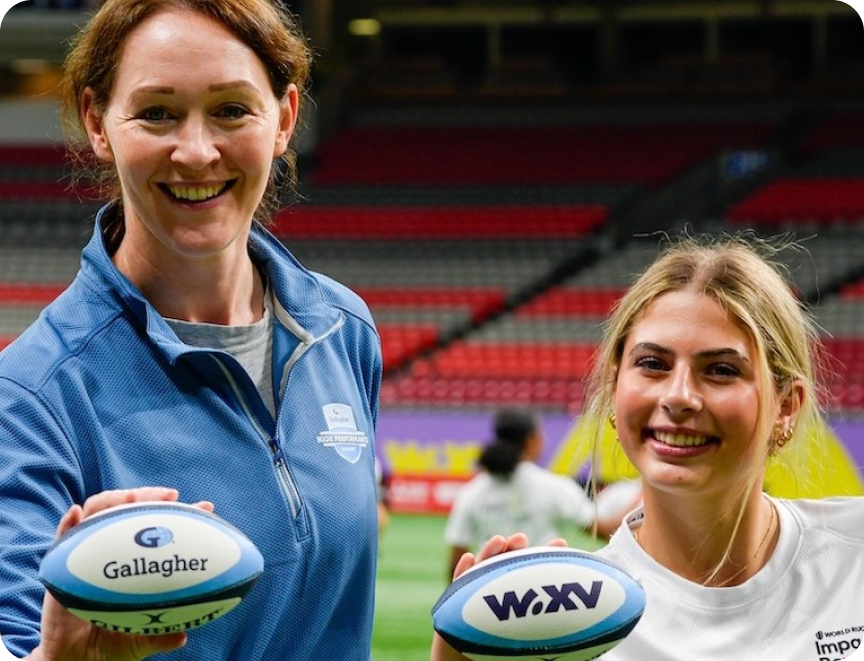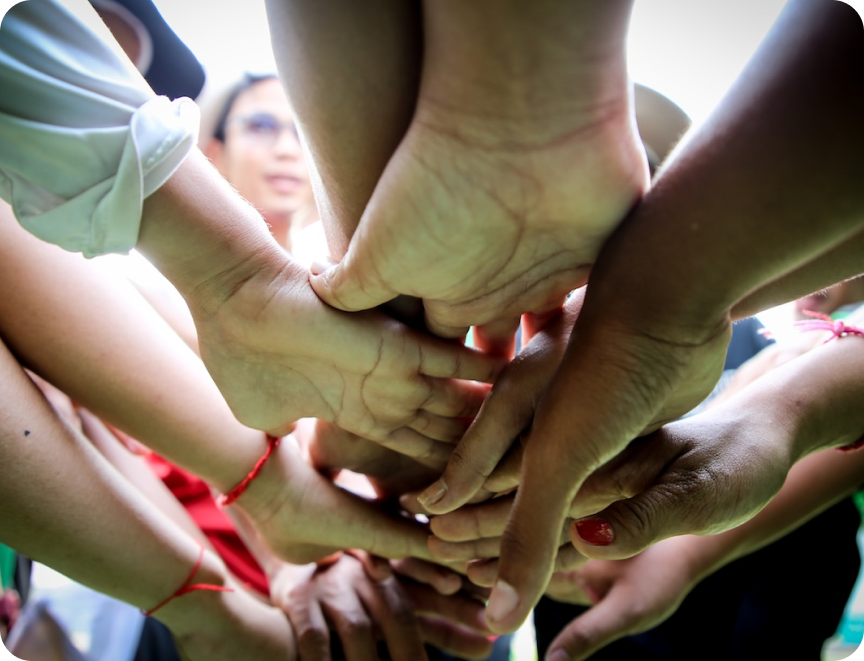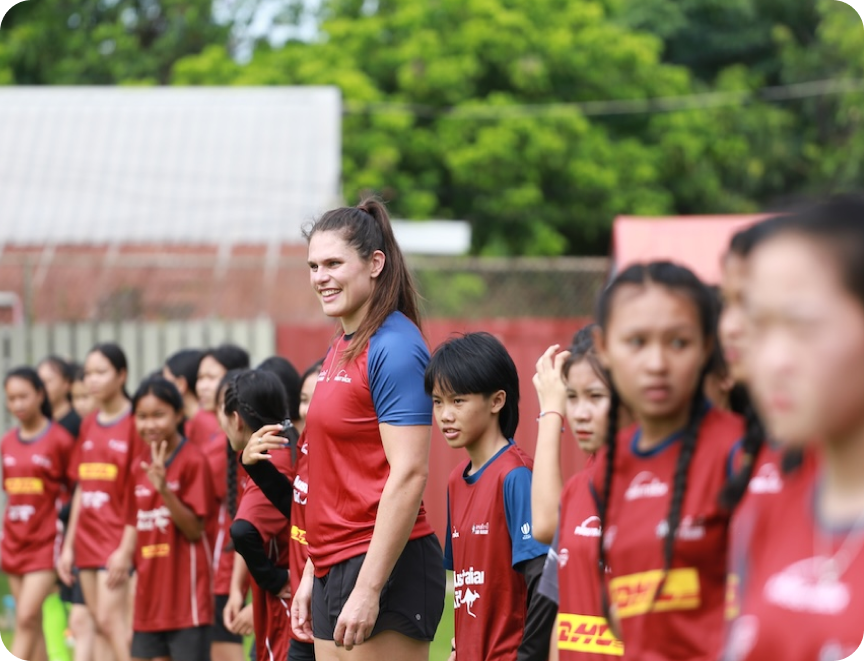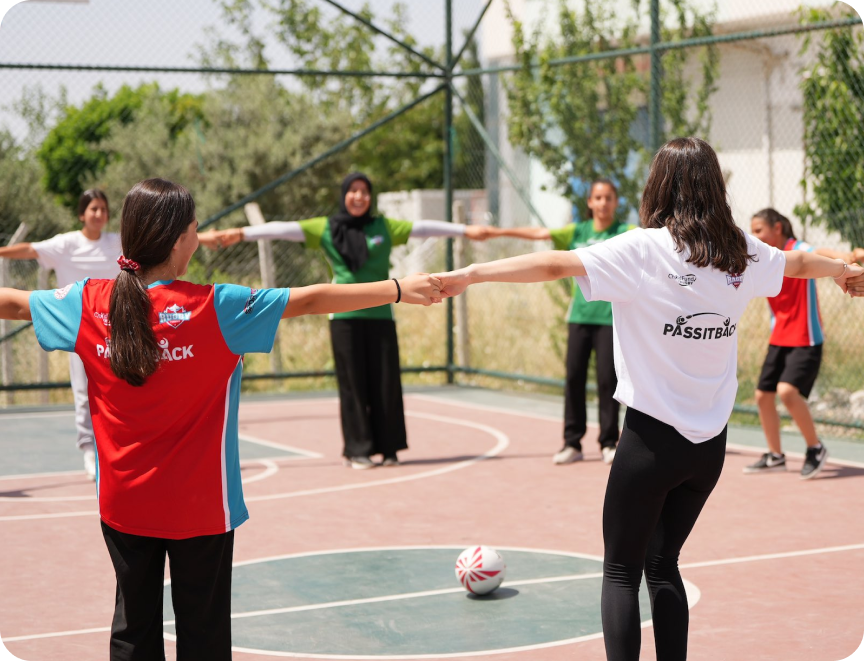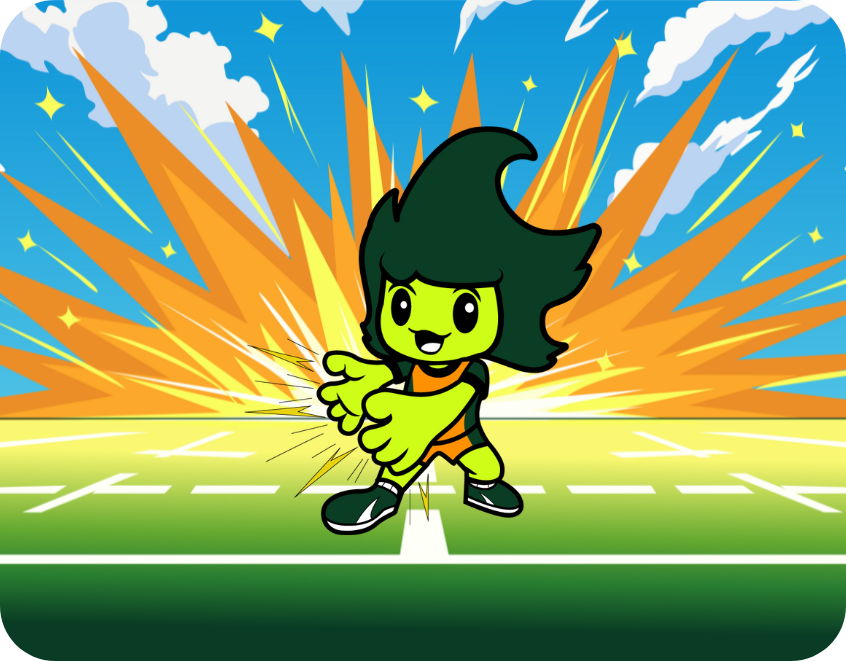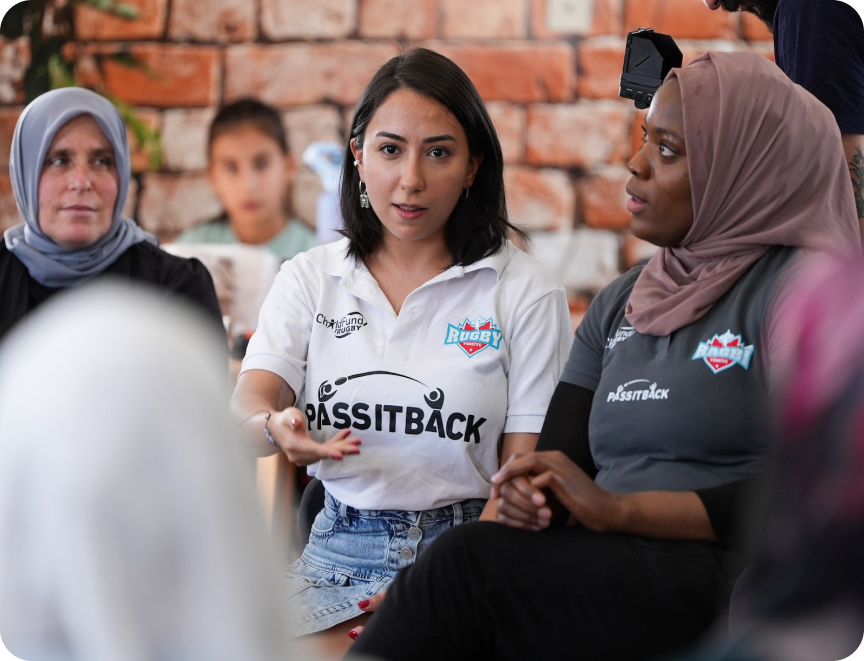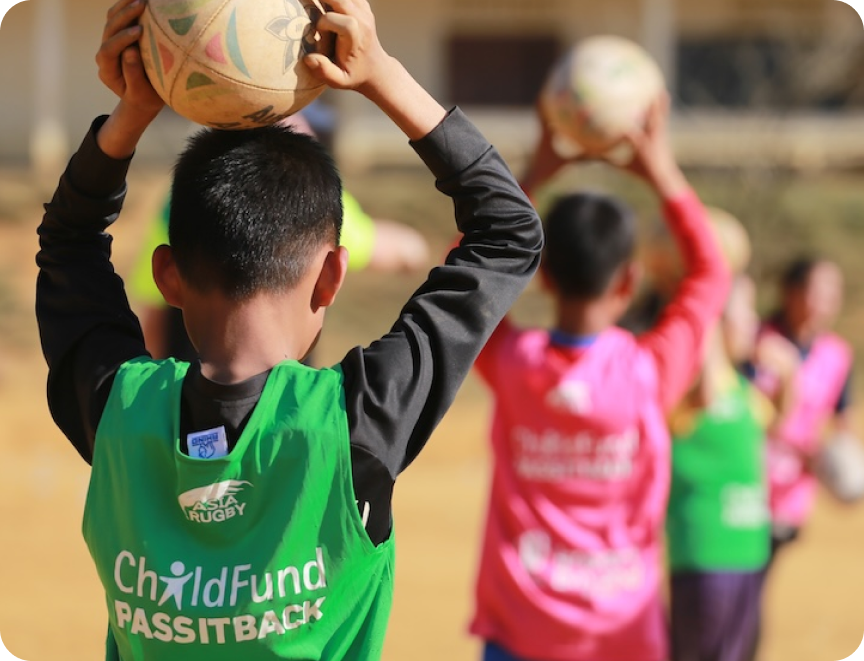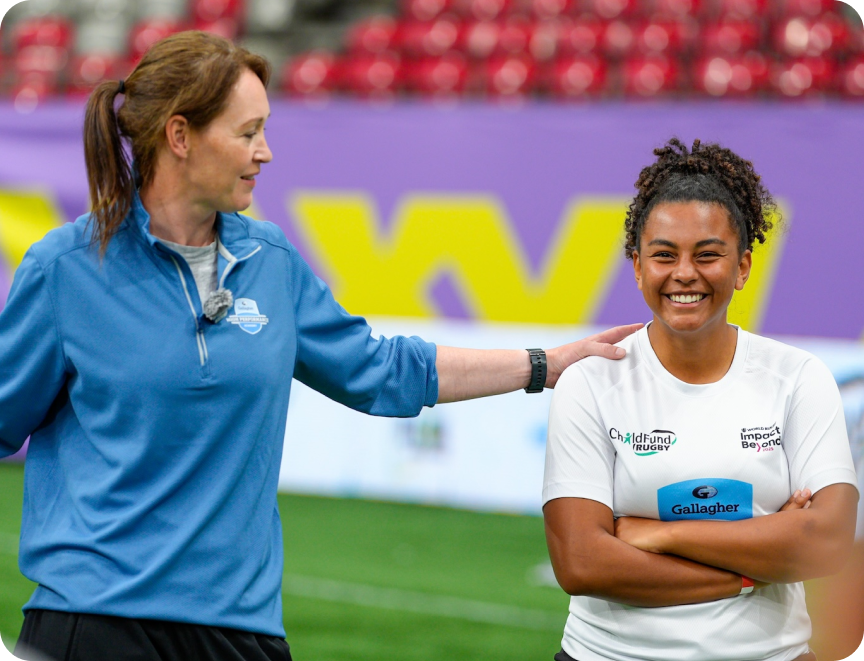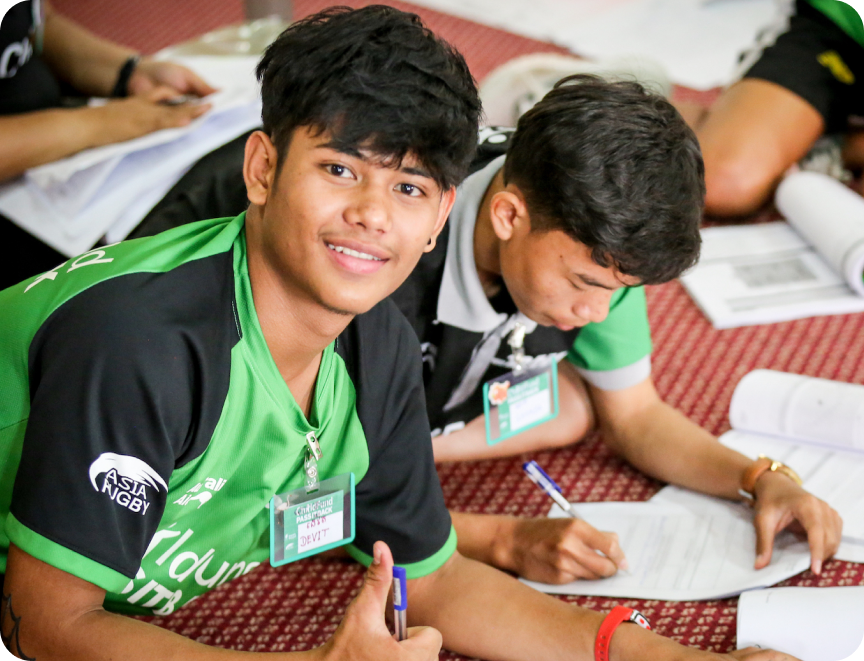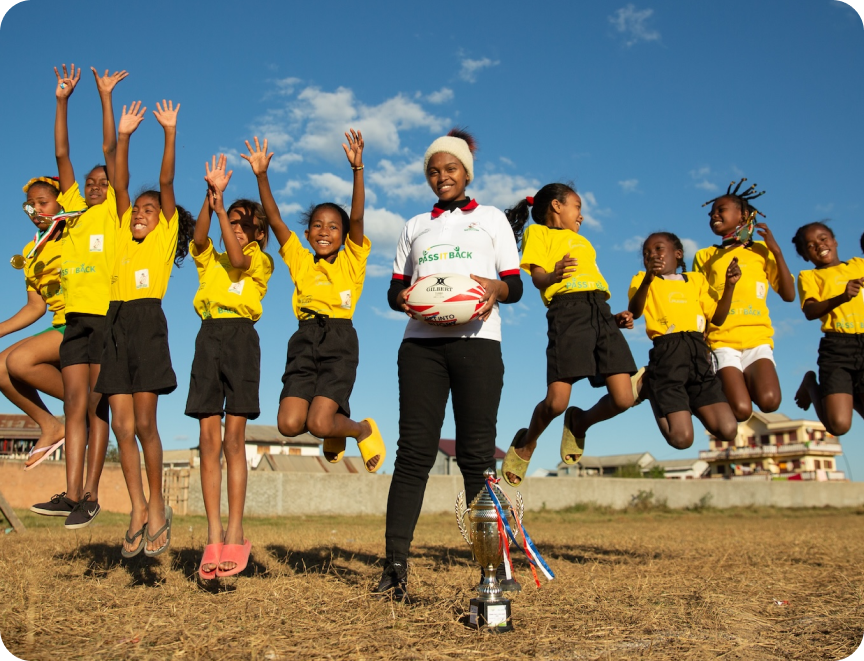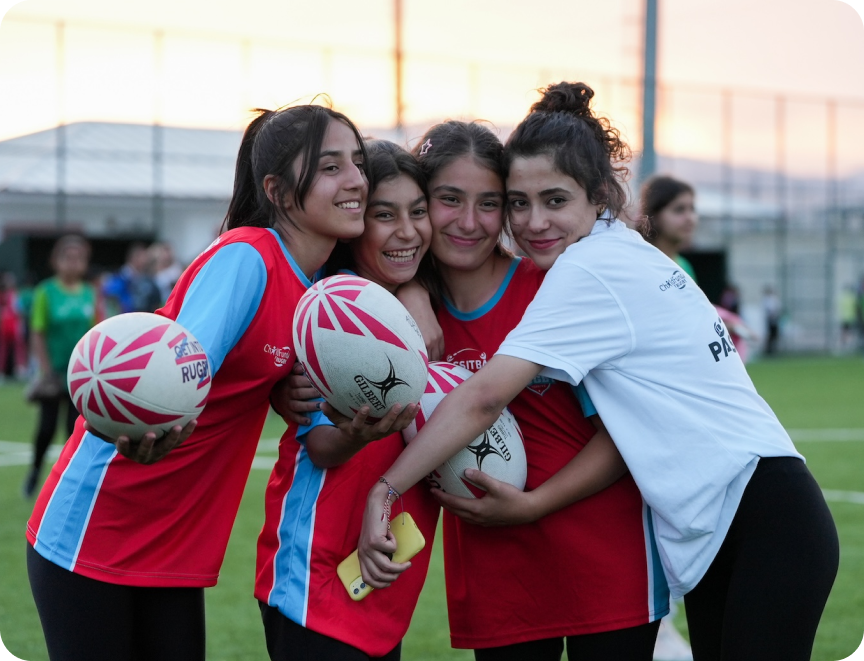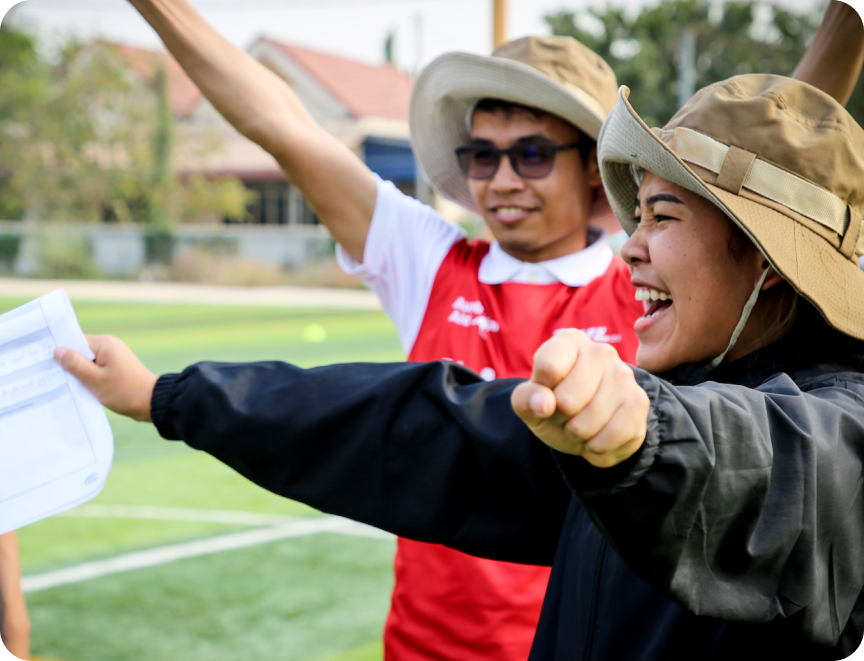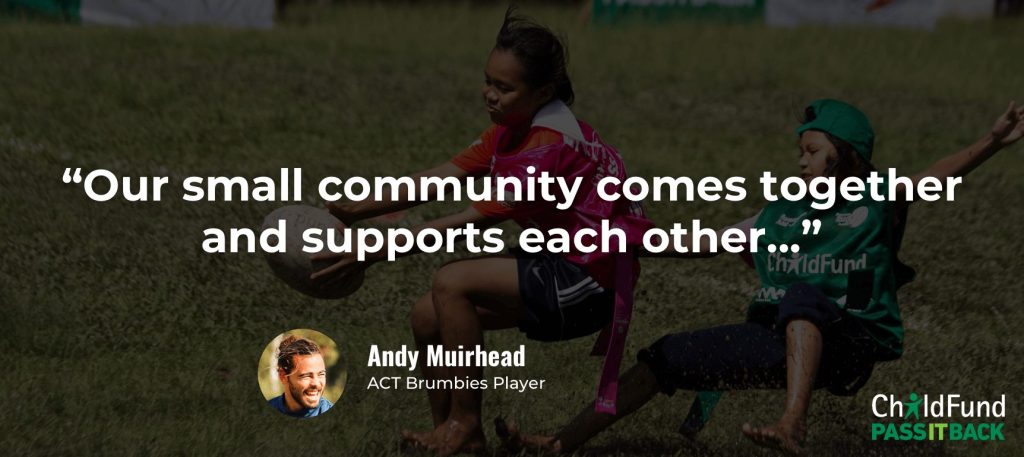Sport isn’t just a game. It’s a useful tool to break down social and cultural barriers off the field.
No matter the sport, players from all walks of life are tasked to work together in pursuit of a common goal: victory over the opposing team. Players must put aside their differences to achieve the win, and what we have found is the lessons learned in the game, will over time, be practised in the players’ communities, changing the livelihoods of all who live there.
With this in mind, we have reached out to some of your favourite rugby players and our ambassadors to get their take on the power of sport to create meaningful change. We asked:
How does sport connect people and communities?
“Sport creates conversations…”
– Chris Mastaglio, Director of ChildFund Pass It Back
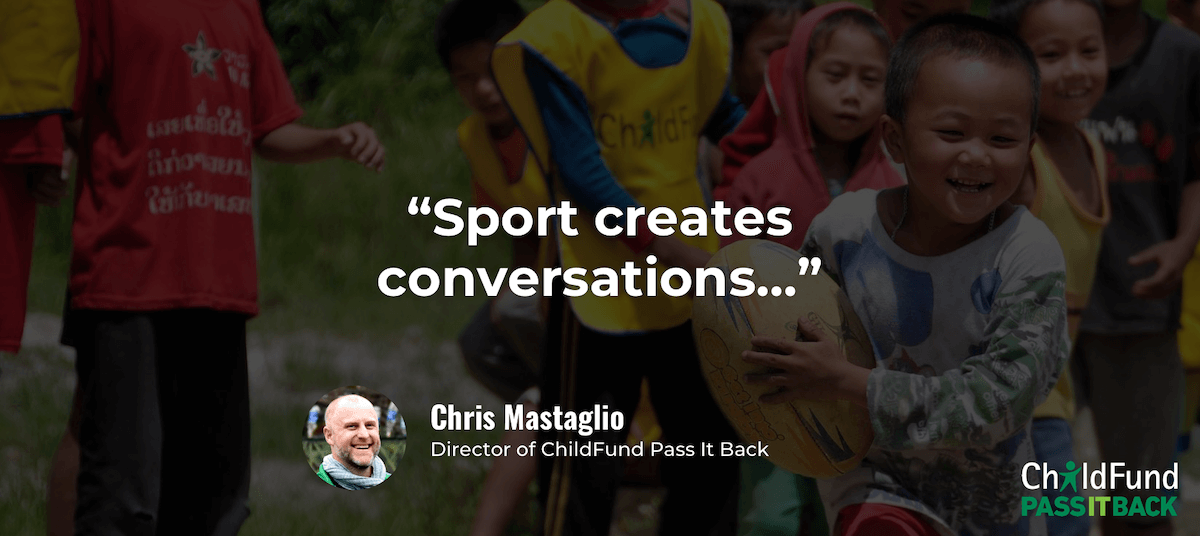
Sport is a great convening tool. From the discussions I’ve heard in Fiji after a World 7s Series rugby event, to Monday morning blues in Laos as someone’s favourite soccer team in Europe has lost, sport creates conversations and gets people together around a common platform.
However, it is not only these top-level events that connect people. Seeing parents cheering their children from the sidelines in Vietnam, or listening to young Lao rugby players talking about how their national team idols played, demonstrates the power of sport as a tool to connect young people to their own communities.
ChildFund Pass It Back has been designed to support equitable participation of girls and women, but the program has also excelled at engaging people from ethnic communities, often disadvantaged in term of access to opportunities.
In these communities, the power of culturally and linguistically relevant role models in sport can be used as an important development tool. Strong, connected role models can mobilise, inspire and positively impact their communities.
Sport is one of the fabrics that connect people and their communities to create positive social change.
“Sport helps to connect people and communities through the creation of heroes…”
– Ada Milby, First female member of the World Rugby Council, Secretary General of the Philippines Rugby Football Union, and former captain of the Philippine’s National Women’s Team
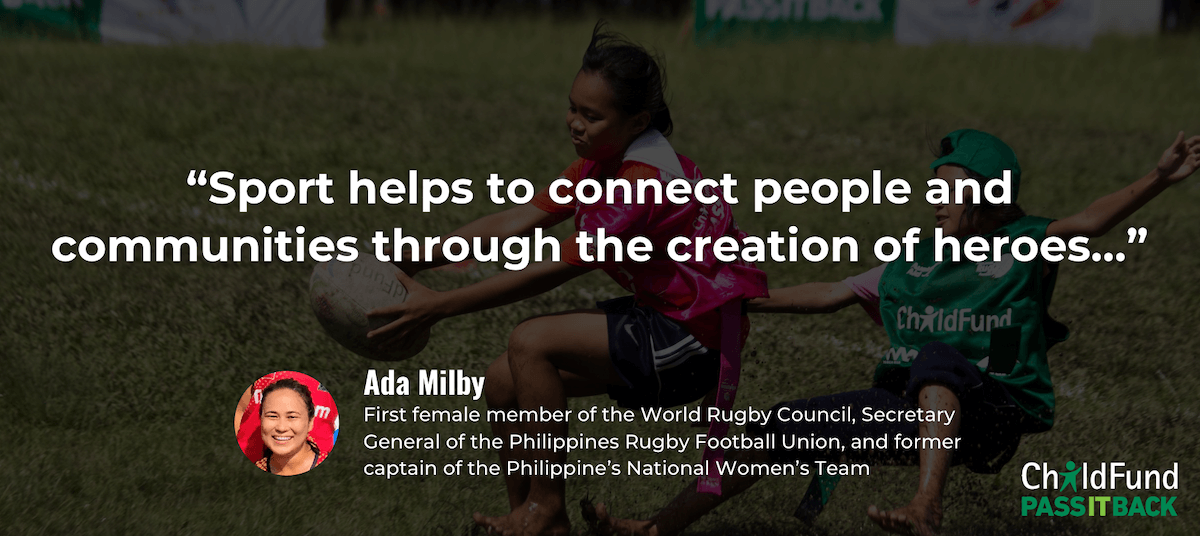
The ability of sport to connect people to communities is strong across all contexts. From the professional level down, sport has a way of creating a sense of community with those connected to it. As an example, if you follow American Football, you can see how fans have the ability to immediately bond with someone they’ve just met supporting the same team.
In Asia, where sport isn’t as accessible or valued, there seems to be a level of respect and support for those who are able to overcome the challenges to participate and excel in sport despite limited resources.
Sport helps to connect people and communities through the creation of heroes and, the more relatable the hero, the stronger the connection.
In the Philippines, Manny Pacquio is revered because he’s a great boxing champion, but also because he is someone who came from a small provincial area with a similar family background to many Filipinos.
It’s part of what makes sport for development programs like ChildFund Pass It Back so successful; when I ask one of the players from a community “who is your favourite rugby hero” they don’t reply with legends like Charlotte Caslick or Sonny Bill Williams, they often refer to their coach or someone else from their community. These local coaches are better equipped to become leaders in their community and inspire others to do the same, lifting the community up together.
“Our love of rugby is what brings us together…”
– Charlotte Caslick, Australian gold medallist, rugby Sevens star and ChildFund Ambassador
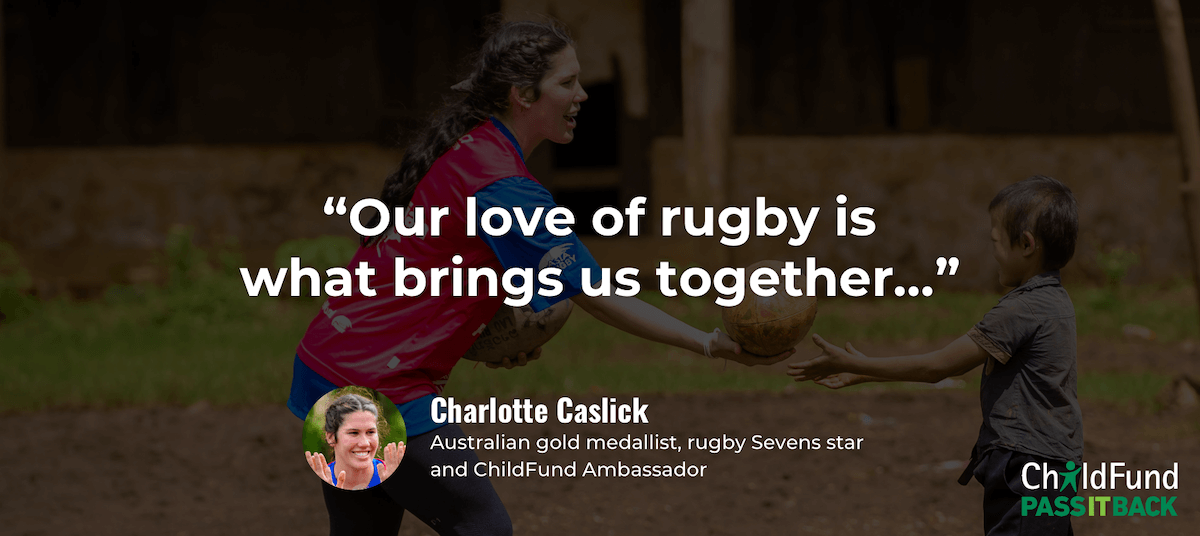
One of the things I love most about my involvement in rugby is the incredible opportunities I have been given to meet and connect with people through sport – in the many regions of Australia, and throughout the world.
Our love of rugby is what brings us together, and this passion that we share is what creates that sense of community.
The power of sport to create a sense of kinship was powerfully demonstrated to me when I visited Laos with ChildFund, and met young players from some of the most remote communities in the country.
Despite having no language in common, and the enormous geographical distance between us, once we were out of the field any barriers between us seemed to fall away. Rugby has a way of creating its own communities, and I am proud to be a part of that.
“That sense of working together and feeling supported…”
– Emily Chancellor, Wallaroos player and ChildFund Ambassador
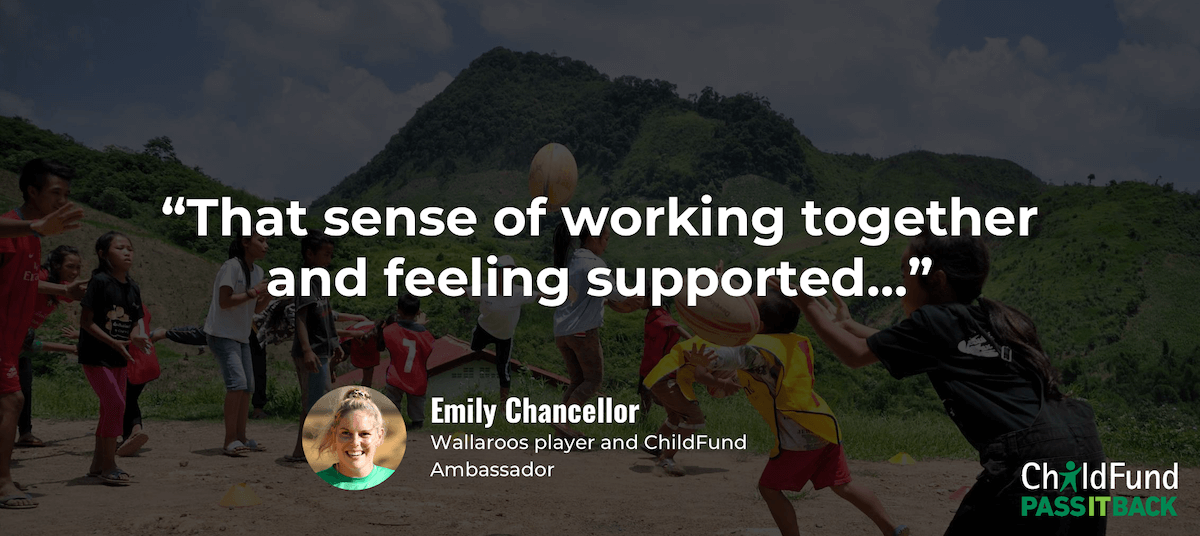
Being involved in sport has made a huge difference to my life – to have a group of friends around you, who can support you both on and off the field, is something really special.
You might be opponents on the field but, when the game is over, you are connected by your love of the sport. I know I can always a laugh with players from other teams and we support each other despite the competitive nature of what we do.
I saw how important this sense of community is when I visited Laos with ChildFund. When you watch the kids on the field and they make a mistake, they still smile because someone’s tapped them on the back and said “that’s ok”.
That strong sense of connection between the players and coaches, that sense of working together and feeling supported, creates such a strong environment in which young people can learn. That is the power of sport.
“Rugby can be a great equaliser and creates communities that are inclusive.”
– Stephen Larkham, former Wallabies player, World Rugby Hall of Fame and ChildFund Ambassador
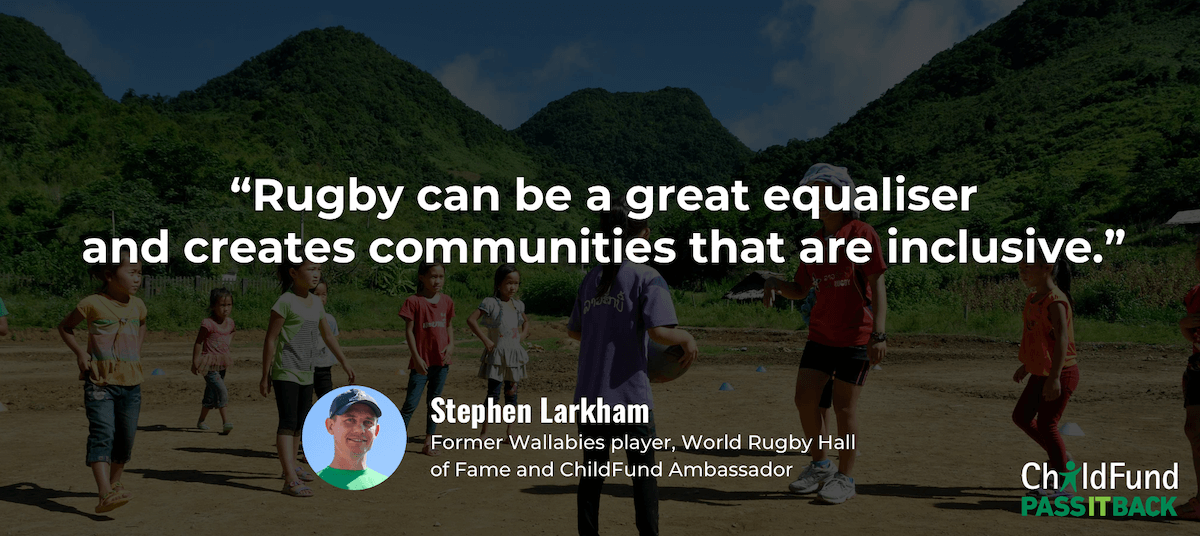
I started playing rugby when I was nine years old, having grown up watching my father play. For me, it was the camaraderie and the sense of being part of a team that really attracted me to the game.
For me personally, being involved with rugby for over two decades has given me so much – the learning that comes with rugby’s values, a group of lifelong friends, and the opportunities to travel and connect to people in different parts of the globe.
I also think rugby can be a great equaliser and creates communities that are inclusive. You can be any shape or size and still play the game and contribute to the end result.
During my visit to Laos with ChildFund, I met players from small villages who are now playing for the national team. I saw rural teams where at least half of all players are girls and young women. I met coaches who are building the resilience of the children they train.
Sport, particularly those that are team-based, has a unique ability to create communities that are safe, supportive and break down barriers between people. For me, this is one of its great strengths, and what makes me proud to be part of the rugby community.
“Sport gave me the opportunity to make friends, learn real life skills and create everlasting memories.”
– Darcy Swain, Brumbies Player

For me personally sport gave me the opportunity to make friends, learn real life skills and create everlasting memories. I still remember playing in my first grand final at the age of 11 in Cairns. That’s the real beauty of it, everyone gets their own story that makes them feel unique and a part of something bigger. It doesn’t necessarily mean you have to be playing, the support staff that work behind the scenes to the day one supporters and parents that take their kids to early Saturday morning sport.
Everyone’s touched by it in one way or another, it’s depth and ability is truly endless and is the reason for me personally why I love all sports and the people and communities that form them.
“Sport is a language in itself and one shared by many.”
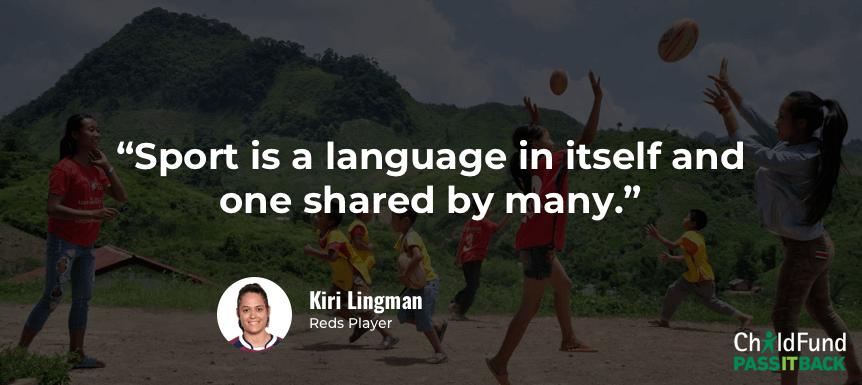
The beauty of sport is how universal it is. Regardless of ethnicity, language or culture, its power lies in its ability to connect people and communities. Relationships newly formed or relationships that last a lifetime, sport is a language in itself and one shared by many. In a personal sense, I’ve had the ability to see corners of the world and understand the diversity of people simply because of sport. Whether it be 50,000 strangers in a stadium, or the intricate relationship of a coach and athlete, the connection sport has the ability to bring is unlike any other.
“Our small community comes together and supports each other…”
– Andy Muirhead, Brumbies Player
I think sport plays a huge part in connecting and meeting so many new people and also the community. In my time at the Brumbies I have learnt how much our small community comes together and supports each other and having something like rugby and sport make that possible.
Help us connect children with sport and change communities
As we’ve heard, team sports like rugby teach invaluable lessons on and off the field. Our contributors, players and ambassadors have left us with five ways sport connects people and communities:
- Sport creates conversations by providing a common ground, and a unified sense of purpose.
- A love of the game and the passion brought to the field forges bonds between players.
- Heroes are created in sport and can become positive role models for the team and wider community.
- Sports facilitate a collaborative and supportive environment where players can thrive and reach their potential.
- Sport is one of the world’s great equalisers, and is a powerful way to overcome barriers and promote inclusion.
ChildFund believes every child has the right to play, learn and grow, which is why ChildFund Pass it Back was originally established for children in developing communities who face significant challenges around poverty and inequality.
Not only does this innovative program promote the right to play in communities where children have little or no access to organised sport, but it provides important learning opportunities around leadership, problem-solving, gender equity, conflict-resolution and planning for the future. Over half of all players and coaches are girls and young women.
To help us expand the program, and reach more children in disadvantaged communities, donate now and break down the barriers of exclusion.
